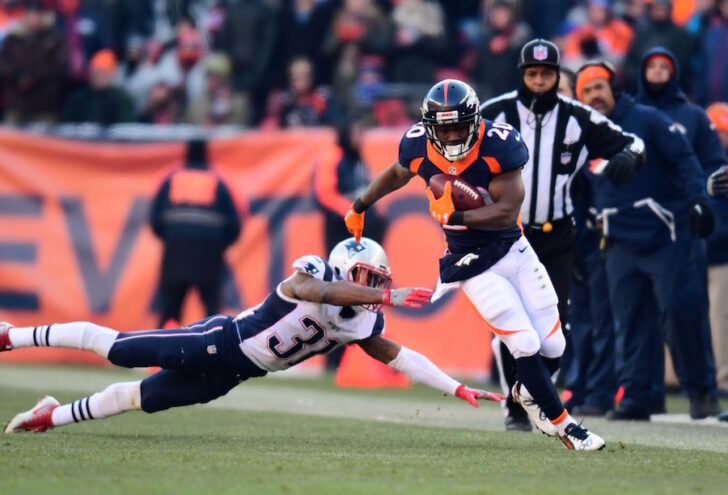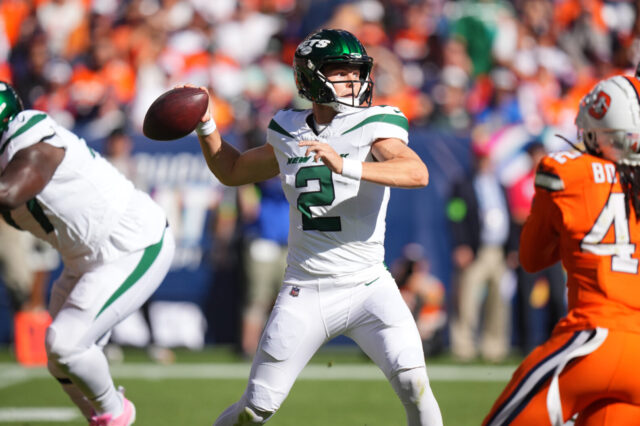For one quarter of football on Sunday in Denver, it appeared the Broncos had finally found a solution in the running game. So why on earth did Gary Kubiak‘s team end the contest with just 58 rushing yards on 17 attempts?
Kubiak is pointing the finger at the passing game. Veteran running back Justin Forsett says its a problem in the red zone. Offensive captain and wide receiver Demaryius Thomas says its breaking from the game plan when things don’t go right.
In truth, they’re probably all right in some capacity. But Sunday’s 16-3 loss to New England, which took Denver out of controlling its own destiny in the playoff chase, was more frustrating than any of Denver’s five other losses this season because on their first three drives they were actually moving the ball well on the ground.
Denver’s offensive struggles have been told over and over and over this season, but in the first quarter against New England it looked like the addition of Forsett to the roster had finally produced the change the offense needed. He broke out for a 13-yard play on the game’s opening play. By the end of their first drive, even though they had to punt the ball away, Forsett had accounted for more rushing yards (19) than the entire team accumulated in their Week 14 loss at Tennessee (18).
On Denver’s next two drives, Forsett was proving to be a spark both as a runner and as a pass-catcher out of the backfield. Forsett, who was signed just last week after Kapri Bibbs was placed on IR, accounted for 15 of 47 yards on four touches on Denver’s only scoring drive of the day. He followed that up with six yards rushing on the next drive before giving way to Devontae Booker, who added eight yards on three touches to help Denver get into the New England red zone.
Most importantly on each of those drives, Trevor Siemian and the offense spread the ball around. Jeff Heuerman, A.J. Derby, Virgil Green and Thomas all had catches over those two drives and they converted six first downs. (They had just 15 on the day). But a costly interception from Siemian seemed to put the brakes on the offense from there.
The offense would end the half with 46 yards rushing. It added just 12 after that point. Forsett ended the game with 53 all-purpose yards, 52 of which came in the first half. Forestt had just two rush attempts, one a seven yard run negated by penalty.
Postgame, head coach Gary Kubiak said it was the passing game’s drop problems that neutralized the running game:
“We moved the ball extremely well in the first half and if we catch a ball in the second half, I think we move the ball some more. We had about four or five balls that we need to make plays on. The first third down of the second half, we’re fixing to be at the 40-yard line. We had some big drops in the game that could have been the difference in us continuing to move the ball late in the second quarter and the third quarter. We didn’t make them.”
Kubiak is correct that drops hurt his offense in the second half. A.J. Derby and Demaryius Thomas both dropped third-down passes that could have extended drives, but the offensive line’s lack of pass protection was also putting them in long down and distance situations that made running in the second half more difficult. Denver opened the half with a sack for a loss of six yards; a Derby drop would have dug them out of that hole, but it was a tough spot to be in to start. In total, Siemian was sacked four times for 31 yards.
Forsett said postgame that the failure to score on the drive that ended in the Siemian interception was a factor in the offense’s struggles later.
“I think we started off with the run in the first play of the game that opened it up. I think it goes back for us that we just have to execute more and extend drives and score in the red zone when we have the opportunities. Then everything opens up,” Forsett said.
As New England tightened up on defense in the second half, Siemian was forced to find his receivers in tighter windows. Unfortunately, Denver didn’t make catches when those windows opened. Thomas had two key drops in the second half, which he says is a big reason the offense struggled on the whole, and why the run game was taken away.
A deep ball that went through his hands could have been a game-changing catch, Thomas says.
“[If] I could have made that play on the deep-ball on the left side, then it would have totally been a different game. We would have been in scoring range. That’s one play you could say would have changed the whole game,” Thomas said.
Those plays where the Broncos beat themselves – penalties, drops, turnovers – caused them to fall behind and thus change the game plan.
“I don’t know. I guess we’re beating ourselves,” Thomas said. “We had a couple penalties, a couple drops. That’s the main thing. If you get behind early in the game, then you have to try to change up the game plan.”
Denver kept things close throughout the game, which makes Thomas’ comments a little strange. Had Kubiak stuck with a more balanced attack and kept Forsett involved in the second half, perhaps that offense would have found another spark.
The media watching from the press box and on their TV sets at home certainly thought so. They had high praise for Forsett and the running game as a whole during that first quarter.
A confluence of events led Kubiak to abandon the run, but it’s hard not to wonder if the game might have played out differently if he had stuck with something that was working early.
Here’s what the team at MHS and some of our favorite follows on Twitter were saying about Forsett and the run game on Sunday…
On Justin Forsett…
Justin Forsett STARTS … and has a nice read of the blocks to get outside … a quick 13 yards.
— Andrew Mason (@MaseDenver) December 18, 2016
After just one week with the team, Justin Forsett is the #Broncos' new starting running back, jumping rookie Devontae Booker on depth chart.
— Jon Heath (@ByJonHeath) December 18, 2016
Justin Forsett might just be the biggest late season addition the #Broncos have ever made
— Darren Copeland (@Darren_Copeland) December 18, 2016
https://twitter.com/RonnieKRadio/status/810601771773165568
Forsett is proving just how bad Booker is #TheBlindfoldedRB
— Michael Jaycox (@MilkyMike) December 18, 2016
I'm liking Forsett. . . Thought he was done. . .
— Gil Whiteley, Now and Then (@Gilfest) December 18, 2016
https://twitter.com/AllbrightNFL/status/783335973073453056
Forsett runs with so much more confidence than Booker. Thrilled the #Broncos were able to acquire him
— Ryan Edwards (@redwardsradio) December 18, 2016
Much better protection from o-line, amazingly improved run game with Justin Forsett, better rhythm w/ no huddle. #Broncos offense clicking.
— Jon Heath (@ByJonHeath) December 18, 2016
Great read by Forsett to cut back for 7 yards, but it's wiped out by an Okung holding penalty.
— Andrew Mason (@MaseDenver) December 18, 2016
The Broncos best back was cut by two other teams this season. . . #WaitWhat
— Gil Whiteley, Now and Then (@Gilfest) December 18, 2016
On the O-Line and Run Game in General…
https://twitter.com/Tyler_Polumbus/status/810599680325390336
#Broncos gained 19 rushing yards, two carries on their 1st drive. They had 18 rushing yards all game v. Titans last week.
— Cameron Wolfe (@CameronWolfe) December 18, 2016
It's amazing how much better #Broncos offense looks when there is a legitimate running threat.
— Darren Copeland (@Darren_Copeland) December 18, 2016
#Broncos OL looks a lot better with Forsett at RB…….
— Benny Bash🎧 (@TheBennyBash) December 18, 2016
There's some better, tough running from Devontae Booker. Running through arm tackles (finally).
— Jon Heath (@ByJonHeath) December 18, 2016
https://twitter.com/ToddRomeroTV/status/810623196659679232
Broncos' lack of run game is due in part to lack of commitment to run game. C.J. Anderson had 20, 20, 14, 19 carries to start season.
— Jon Heath (@ByJonHeath) December 18, 2016
With the way Broncos ol is blocking. They need Houdini at qb or new ol. Only 2 choices.
— shannon sharpe (@ShannonSharpe) December 18, 2016



